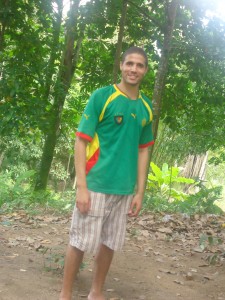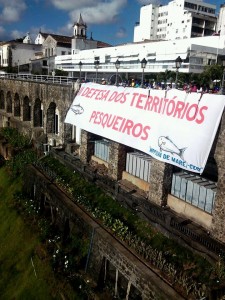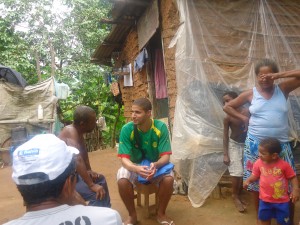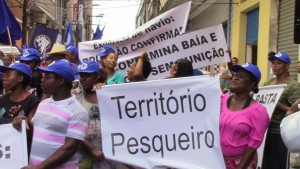What is diversity? Why must we, as geographers, be concerned with how our work addresses power disparities and social differences?

Adam Bledsoe, a recent graduate of the Department of Geography, studies traditional Afro-Brazilian communities who defend their land from appropriation. His research offers insights into why diverse geographical knowledges matter. Adam shares his approach to diversity in this engaging profile, the first in a series of features to be presented by the Diversity Committee of the Department of Geography. Through these profiles, we seek to highlight the broad array of research, teaching and advocacy work our undergraduates, graduates and faculty undertake to address questions of power and injustice.
UPDATE: We are thrilled to share that Adam has accepted a two year position as Postdoctoral Fellow at the prestigious Center for Research on Race and Ethnicity in Society and Visiting Assistant Professor in the Department of Geography at Indiana University, Bloomington! Keep an eye out for forthcoming publications!
Diversity Research Profile: Adam Bledsoe, PhD
- How do you define “diversity”?
I would define diversity as the presence of and respect for a diversity of experiences and points of view. Respecting these experiences and opinions and paying them heed in decisions and actions is as important, if not more, than their simple presence. Without allowing diversity to influence the trajectory of an institution, program, etc., it becomes a hollow catchword.
- How have diversity questions or issues shaped you as a scholar?

I think being exposed to multiple experiences and viewpoints throughout my personal, educational, and professional life has made me open to various ways of knowing and existing in the world. Because of my early experiences with people from various walks of life, I came to distrust dominant narratives that we’re fed as young people. As a result, I’ve tried to focus my intellectual work on exploring and privileging marginalized ways of thinking and acting in the world. My hope is that my scholarship can in some way contribute to envisioning new ways of relating to the world and each other.
- What challenges or possibilities do you see for the discipline of geography as related to diversity? What can we do to address these issues in geography?
I think one of the main things the discipline of geography can do is to engage with alternative geographical concepts. In the academic realm, this could mean working with and through non-American geographers and theories of geography. This could also mean appealing to actors (both domestic and foreign) that have been traditionally ignored or marginalized in the discipline. Women and people of color, specifically, come to mind as actors whose geographic sensibilities have long been marginalized. This is important because acknowledging and taking heed of competing geographical notions moves beyond the all-important approach of illuminating and critiquing dominant notions of space. By recognizing the spatial capacity of marginalized actors, we, as geographers, can work to identify and push forward wholly new ways of living in the world.
- What is your research focus and how does it relate to diversity? Why are diversity issues important in your research?
 My research focuses broadly on the geographical critiques and expressions of Black populations in the Americas. Through my work I try to show how diversity of experience and aspirations comes from notions of difference and the oppression that accompanies those notions. My dissertation takes the case of three communities in Brazil that were started by slaves and runaway slaves and explores the ways in which they presently seek to defend their traditional territories from public and private actors intent on appropriating their land. My work departs from the notion that there are and must be diverse ways of existing in this world and that the practitioners of these diverse existences continue to persevere amidst structural oppression and violence. Exploring these diverse ways of life is important because I believe that it is only through such ways of life that our world can address and change the destruction wrought by predominant forms of material and social production.
My research focuses broadly on the geographical critiques and expressions of Black populations in the Americas. Through my work I try to show how diversity of experience and aspirations comes from notions of difference and the oppression that accompanies those notions. My dissertation takes the case of three communities in Brazil that were started by slaves and runaway slaves and explores the ways in which they presently seek to defend their traditional territories from public and private actors intent on appropriating their land. My work departs from the notion that there are and must be diverse ways of existing in this world and that the practitioners of these diverse existences continue to persevere amidst structural oppression and violence. Exploring these diverse ways of life is important because I believe that it is only through such ways of life that our world can address and change the destruction wrought by predominant forms of material and social production.
- Who inspires you in diversity-related work, whether that is a scholar you follow, an activist, or another role model?
My adviser, Alvaro Reyes, is an inspiration as far as someone who has committed themselves to studying and privileging diverse ways of existing in the world. Alvaro is particularly impressive given his commitment to diverse geographical expressions as evidenced among both indigenous and Afro-descendant populations around the world. Such an approach is precisely the form of diversity that I feel is most important for improving our future, as it acknowledges the presence and viability of multiple ways of living in the world. I also find the communities I work with to be a great source of inspiration. In Brazil I work with communities that insist on the right to defend their territory and continue their traditional way of life. This means rejecting state-sponsored programs that promise to displace them and further degrade the environment on which they depend for subsistence. Their resolve to remain true to their traditions of self-subsistence and cultural expression—which depart from the Brazilian status quo—is a testament to their desire to maintain their unique way of life.
- What are some of the implications related to diversity from your writings/publications?
 My writings focus on the material expressions of diversity and what this looks like politically. You can see from my attached works how I have sought to represent diverse knowledges and ways of relating to the world.
My writings focus on the material expressions of diversity and what this looks like politically. You can see from my attached works how I have sought to represent diverse knowledges and ways of relating to the world.
Recent publications:
News in publication (Graduate Student Bledsoe publishes paper entitled “The Negation and Reassertion of Black Geographies in Brazil”)
Online publication (Why Does the University of North Carolina at Chapel Hill Continue to Honor the KKK?)

